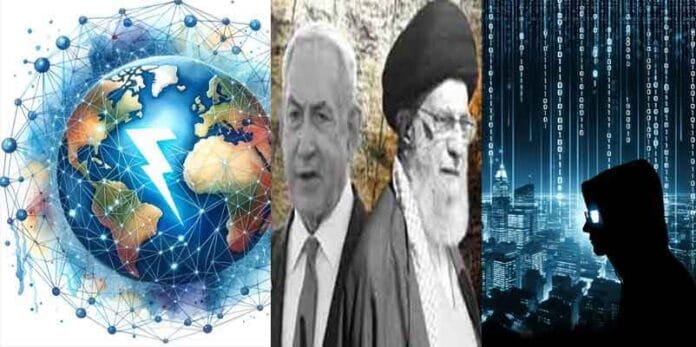INVC NEWS
Tehran : The recent cyber attack on Iran has raised significant concerns, not only within the region but also on a global scale. As tensions between Iran and Israel continue to escalate, the sophistication and scale of the attack have attracted widespread attention. Cyber warfare is emerging as one of the most potent tools in international conflicts, and this attack serves as a powerful reminder of its growing importance.
Overview of the Cyber Attack
On October 12, 2024, reports surfaced detailing a massive cyber attack that targeted critical infrastructure in Iran. According to Iranian state media and cybersecurity experts, the attack primarily focused on energy grids, government servers, and financial institutions. The disruption was felt across several key sectors, leading to widespread outages, delays, and financial losses.
The timing of the attack is particularly significant, coming amidst heightened tensions between Iran and Israel. Many analysts believe this cyber assault is linked to ongoing diplomatic and military frictions, further complicating the already fragile relationship between the two nations.
Extent of the Damage
While Iranian authorities have not fully disclosed the total impact, preliminary reports indicate that the attack was among the largest in the country’s history. Vital services such as electricity and internet connectivity were temporarily disrupted in multiple regions. Major cities, including Tehran and Isfahan, reportedly experienced blackouts, while businesses faced difficulties in accessing financial systems.
Iranian cybersecurity officials have since announced that they are investigating the origins of the attack, stating that the assailants used advanced methods to infiltrate key systems. They emphasized that national security, public utilities, and critical infrastructure were the primary targets.
Potential Role of Israel
In recent years, Israel and Iran have been engaged in what many call a “shadow war,” involving cyber operations, covert actions, and proxy battles. Israel has a well-known history of launching preemptive cyber strikes, particularly against Iranian nuclear and military facilities. While no official statement has been made by Israeli authorities regarding their involvement in the October 12 attack, suspicions remain high.
Past Cyber Incidents Between Israel and Iran
This is not the first time Iran has been on the receiving end of a cyber attack believed to be orchestrated by Israel or its allies. The infamous Stuxnet virus that targeted Iran’s nuclear facilities in 2010 was widely attributed to a joint Israeli-American operation. In the years following Stuxnet, both nations have engaged in tit-for-tat cyber warfare. Israel has accused Iran of launching attacks on its water infrastructure and financial sectors, while Iran has been linked to cyber assaults on Israeli energy grids and government databases.
The October 12 attack is viewed by many as a continuation of this clandestine conflict, with cyber warfare emerging as a key battleground between the two nations. The geopolitical stakes are higher than ever, and cyber capabilities have become critical in determining the balance of power in the region.
Cyber Warfare in the Middle East
The Middle East has increasingly become a focal point for cyber warfare. As nations in the region invest heavily in both offensive and defensive cyber capabilities, these attacks have grown in scale, sophistication, and frequency. Iran, Israel, Saudi Arabia, and the United Arab Emirates are all major players in the cyber domain, frequently engaging in covert operations to disrupt each other’s systems.
Iran’s Cyber Defense Capabilities
In response to mounting threats, Iran has invested significantly in bolstering its cyber defenses. The country has developed a cadre of highly skilled cyber units, often referred to as APT groups (Advanced Persistent Threats), tasked with both defending national infrastructure and launching retaliatory cyber strikes. Iranian groups such as APT33, APT34, and APT35 have been involved in numerous high-profile cyber incidents, both within the region and internationally.
Despite these efforts, the recent attack exposes vulnerabilities in Iran’s cyber infrastructure. Iranian officials have vowed to improve their cyber defense systems and hold the perpetrators accountable.
Global Implications of the Cyber Attack
The global implications of this cyber attack extend far beyond the immediate Iran-Israel conflict. Cyber warfare has the potential to destabilize entire regions, impacting not only the targeted countries but also international trade, energy markets, and financial systems. The Middle East is home to some of the world’s largest oil and gas reserves, and any disruption in this region could have far-reaching consequences for global energy prices and economic stability.
Energy Security and Cyber Threats
Energy infrastructure, in particular, is highly susceptible to cyber threats. The attack on Iran’s energy grids serves as a stark reminder of the vulnerabilities that exist in this critical sector. As more energy systems become digitized and reliant on networked control systems, the risk of cyber attacks grows. Governments and corporations worldwide are now more aware than ever of the need to invest in cybersecurity measures to protect against such threats.
International Response and Future Outlook
The international community has been closely monitoring the situation in Iran following the cyber attack. Global cybersecurity experts, including those from the United States and European Union, have condemned the attack, warning that it could lead to further destabilization in an already volatile region.
Call for Stronger Cyber Norms
In light of the attack, there has been renewed discussion about establishing stronger international norms and agreements on cyber warfare. While the United Nations and other international bodies have made efforts to create guidelines for acceptable behavior in cyberspace, the enforcement of such norms remains a significant challenge. The lack of clear attribution in many cyber incidents complicates efforts to hold perpetrators accountable, creating an environment where states can engage in cyber aggression with relative impunity.
Cyber Warfare and the Risk of Escalation
One of the key concerns following this attack is the risk of escalation. As cyber attacks become more frequent and damaging, there is a growing risk that they could spill over into conventional military conflict. A successful cyber strike against critical infrastructure could be perceived as an act of war, potentially triggering retaliatory military action.
Iran has already hinted at the possibility of responding to this attack through both cyber and conventional means, though it remains unclear what form this retaliation might take. The situation is fluid, and the potential for further conflict remains high.
















